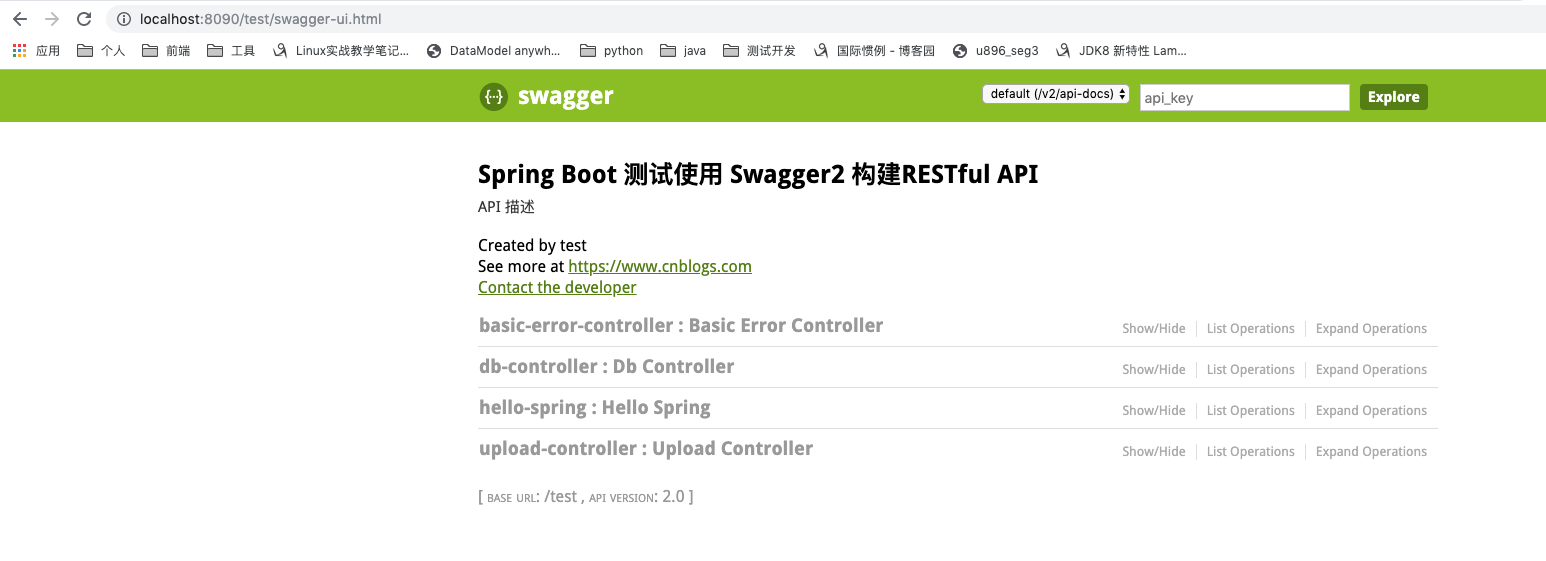Swagger是全球最大的OpenAPI规范(OAS)API开发工具框架,支持从设计和文档到测试和部署的整个API生命周期的开发。简单点说,就是按照swagger的规范书写接口,swagger会自动帮你生成接口文档、以及接口的测试
将swagger整合到spring boot项目中
1、配置依赖的包
<dependency> <groupId>io.springfox</groupId> <artifactId>springfox-swagger2</artifactId> <version>2.4.0</version> </dependency> <dependency> <groupId>io.springfox</groupId> <artifactId>springfox-swagger-ui</artifactId> <version>2.4.0</version> </dependency>
2、swagger配置文件
@Configuration @EnableSwagger2 public class SwaggerConfiguration { /** * swagger2的配置文件,这里可以配置swagger2的一些基本的内容,比如扫描的包等等 * @return */ @Bean public Docket createRestfulApi(){ return new Docket(DocumentationType.SWAGGER_2) .apiInfo(apiInfo()) .select() // .apis(RequestHandlerSelectors.basePackage("com.lance.learn.springbootswagger.controller")) //暴露接口地址的包路径 .paths(PathSelectors.any()) .build(); } /** * 构建 api文档的详细信息函数,注意这里的注解引用的是哪个 * @return */ private ApiInfo apiInfo(){ return new ApiInfoBuilder() //页面标题 .title("Spring Boot 测试使用 Swagger2 构建RESTful API") //创建人 .contact(new Contact("test", "https://www.cnblogs.com", "123@qq.com")) //版本号 .version("2.0") //描述 .description("API 描述") .build(); } }
3、对于接口的配置--基于注解
@Api()用于类:表示标识这个类是swagger的资源 不标识也无所谓
@Api(value="用户controller",tags={"用户操作接口"})
@ApiOperation()用于方法; 表示一个http请求的操作 不标识也无所谓
@ApiOperation(value="根据用户编号获取用户姓名", notes="test: 仅1和2有正确返回")
@ApiImplicitParam() 用于方法 表示单独的请求参数
@ApiImplicitParam(paramType="query", name = "userNumber", value = "用户编号", required = true, dataType = "Integer")
@ApiImplicitParams() 用于方法,包含多个 @ApiImplicitParam
@ApiImplicitParams({ @ApiImplicitParam(paramType="query", name = "userId", value = "用户ID", required = true, dataType = "Integer"), @ApiImplicitParam(paramType="query", name = "password", value = "旧密码", required = true, dataType = "String"), @ApiImplicitParam(paramType="query", name = "newPassword", value = "新密码", required = true, dataType = "String") })
4、效果展示
